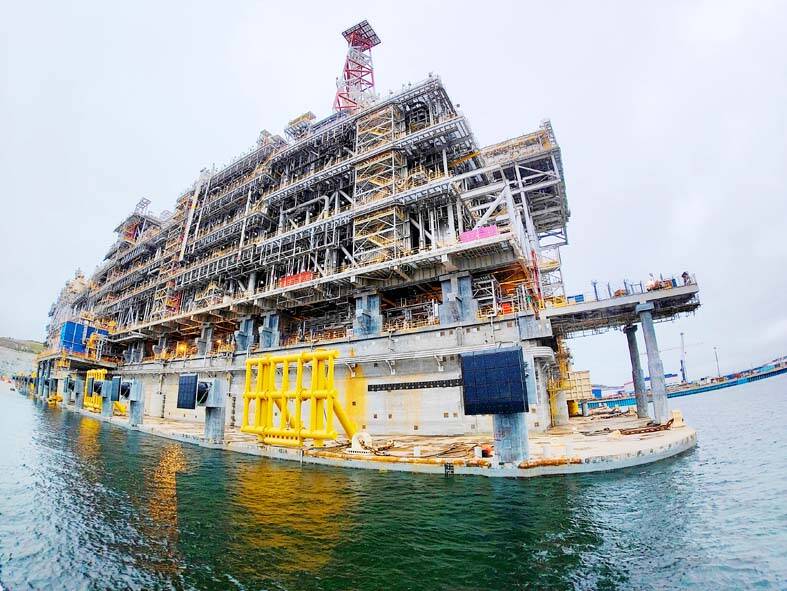Taiwan’s petrochemical industry imported record amounts of Russian naphtha last month, snapping up fresh supplies being churned out by an oil refinery thousands of miles away.
The nation imported almost 114,000 barrels a day of Russian naphtha last month, representing 66 percent of its total imports of the feedstock for the month, data from energy analytics firm Kpler showed. The hike — to an all-time high — consolidates Russia’s ranking as Taiwan’s top supplier, a position previously held by the United Arab Emirates.
The surge is mainly driven by a recent startup of a third condensate splitter at Novatek PJSC’s Ust-Luga refinery, Kpler lead crude analyst Viktor Katona said.

Photo: Reuters
So far this year, Taiwan was the destination for as much as 78 percent of all Novatek’s monthly naphtha exports from the Baltic Sea port, Kpler’s figures showed.
Russian fuel producers have been expanding in Asia and Latin America after western countries and their allies, earlier the main consumers of Russia’s oil products, banned the imports following the invasion of Ukraine.
Novatek’s Ust-Luga refinery processes condensate, a very light type of oil. It brought a third splitter online in mid-August, allowing for increased naphtha flows, Katona said.
As a result, in the second half of August and early September, the plant raised its processing runs to a historic high of more than 195,000 barrels a day, compared to around 140,000 barrels a day in previous months, industry data seen by Bloomberg showed.
That ramp up move coincided with a jump in Russian naphtha exports to Taiwan. It takes roughly 60 days for the Ust-Luga cargoes to reach the Asian country.
Shortly after the third splitter came online, Novatek started maintenance at at least one of the original units, which temporarily cut the plant’s runs, the industry data seen by Bloomberg showed
“Novatek’s Ust-Luga facility has yet to see a month when all three splitters are running at full capacity,” Katona said. “Once that happens in December or January, Russian flows to Taiwan could easily stay above 100 thousand barrels per day on a sustainable basis.”
Novatek did not respond to a request for a comment on the maintenance schedule and production levels at its Ust-Luga refinery.

Taiwan Semiconductor Manufacturing Co (TSMC, 台積電) would not produce its most advanced technologies in the US next year, Minister of Economic Affairs J.W. Kuo (郭智輝) said yesterday. Kuo made the comment during an appearance at the legislature, hours after the chipmaker announced that it would invest an additional US$100 billion to expand its manufacturing operations in the US. Asked by Taiwan People’s Party Legislator-at-large Chang Chi-kai (張啟楷) if TSMC would allow its most advanced technologies, the yet-to-be-released 2-nanometer and 1.6-nanometer processes, to go to the US in the near term, Kuo denied it. TSMC recently opened its first US factory, which produces 4-nanometer

GREAT SUCCESS: Republican Senator Todd Young expressed surprise at Trump’s comments and said he expects the administration to keep the program running US lawmakers who helped secure billions of dollars in subsidies for domestic semiconductor manufacturing rejected US President Donald Trump’s call to revoke the 2022 CHIPS and Science Act, signaling that any repeal effort in the US Congress would fall short. US Senate Minority Leader Chuck Schumer, who negotiated the law, on Wednesday said that Trump’s demand would fail, while a top Republican proponent, US Senator Todd Young, expressed surprise at the president’s comments and said he expects the administration to keep the program running. The CHIPS Act is “essential for America leading the world in tech, leading the world in AI [artificial

REACTIONS: While most analysts were positive about TSMC’s investment, one said the US expansion could disrupt the company’s supply-demand balance Taiwan Semiconductor Manufacturing Co’s (TSMC, 台積電) new US$100 billion investment in the US would exert a positive effect on the chipmaker’s revenue in the medium term on the back of booming artificial intelligence (AI) chip demand from US chip designers, an International Data Corp (IDC) analyst said yesterday. “This is good for TSMC in terms of business expansion, as its major clients for advanced chips are US chip designers,” IDC senior semiconductor research manager Galen Zeng (曾冠瑋) said by telephone yesterday. “Besides, those US companies all consider supply chain resilience a business imperative,” Zeng said. That meant local supply would

BIG INVESTMENT: Hon Hai is building the world’s largest assembly plant for servers based on Nvidia Corp’s state-of-the-art AI chips, Jalisco Governor Pablo Lemus said The construction of Hon Hai Precision Industry Co’s (鴻海精密) massive artificial intelligence (AI) server plant near Guadalajara, Mexico, would be completed in a year despite the threat of new tariffs from US President Donald Trump, Jalisco Governor Pablo Lemus said. Hon Hai, also known as Foxconn Technology Group (富士康科技集團), is investing about US$900 million in what would become the world’s largest assembly plant for servers based on Nvidia Corp’s state-of-the-art GB200 AI chips, Lemus said. The project consists of two phases: the expansion of an existing Hon Hai facility in the municipality of El Salto, and the construction of a